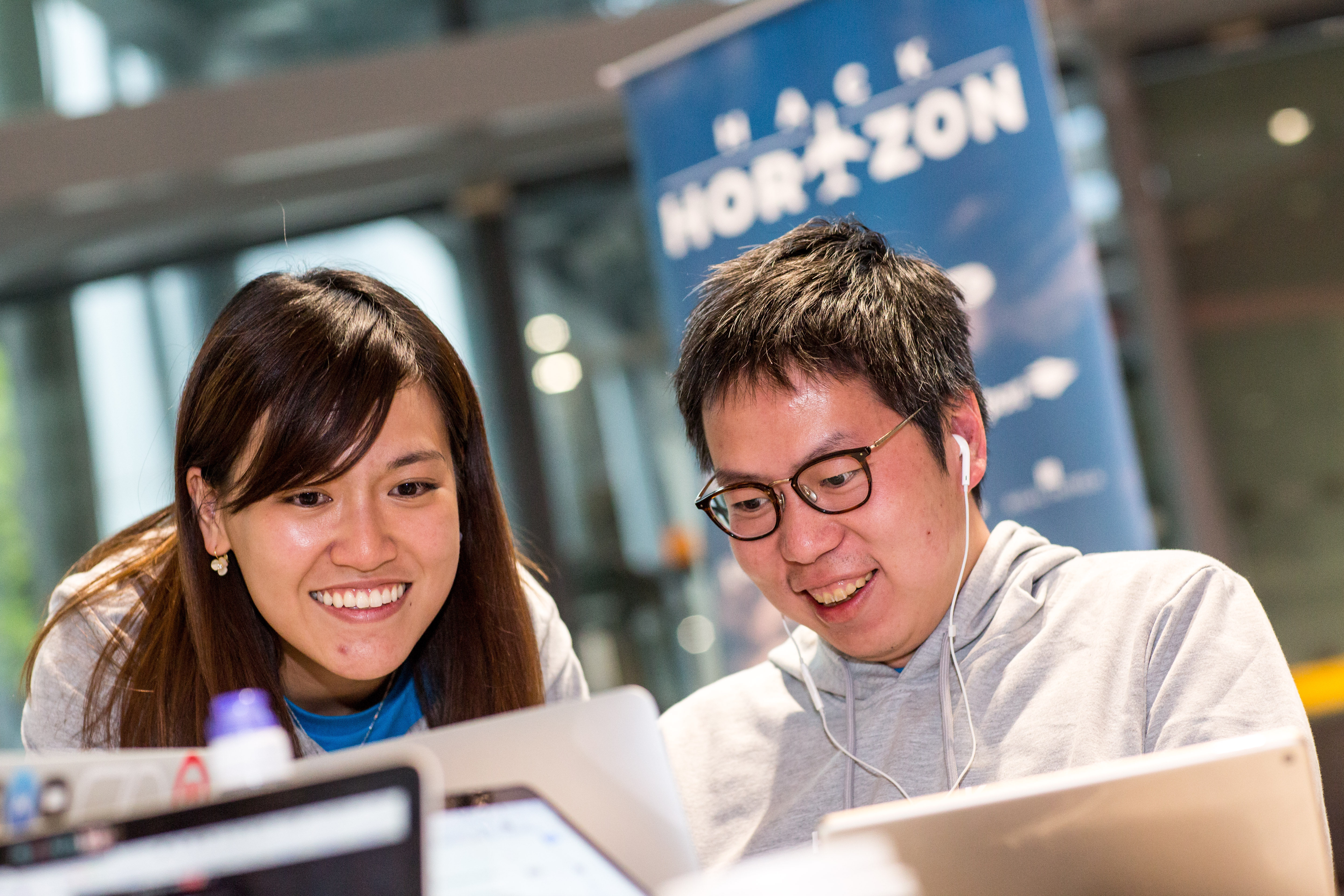As well as teaching many of the skills the new breed of entrepreneur will need, the HKUST Business School also serves as an incubator for real-world ideas and a place where creative relationships and teams can be formed.
Former and current Global Business (GBUS) undergraduate students, Johannes Jaeger and Sandra Sobanska, met at HKUST. In May this year, the duo saw the unique hackathon they co-created, take wing and fly.
Hack Horizon charged 32 talented entrepreneurs, engineers and designers - chosen from more than 700 applicants from around the globe - with the mission of building new products and services that can make travel “simpler, safer, cheaper and way more fun”.
Blue-sky thinking
What made Hack Horizon one of a kind was the fact that 12 hours of this three-day event took place at 40,000 feet above the ground, with participants commandeering the premium economy section of a British Airways flight from Hong Kong to London to develop their ideas.
Getting such an ambitious project off the ground took 18 months of planning and hard work.
“For Asia, hackathons are still a very new thing,” explains Jaeger, who handled operations on the project and worked with the sponsors and partners in Hong Kong. “Getting the first key partner, an airline, on board was very tough - and most of our other contracts were conditional on us getting the airline.”
During the course of this event, the participants were given a unique opportunity to immerse themselves into the passenger experience and understand better the industry in two major cities in the world.
Sobanska’s brief included marketing and design. She says she was struck by how radically the participants’ ideas changed, and were refined, as they took advantage of the access to industry insiders’ knowledge, and the opportunity to meet customers, opened up by the competition.
Hack Horizon’s Co-Founders (middle - clockwise): Kristy Hart, Johannes Jaeger (BBA in Global Business of Class 2017), Kostadin Kolev, and Sandra Sobankska (BBA in Global Business of Class 2018)
The 32 participants split into eight teams to design a wide range of prototypes. Ideas included an end-to-end security luggage transfer service powered by blockchain, and a smart watch that leverages deep learning to personalize the passenger experience at airports.
“Ultimately, the winning ideas were the ones most easy to implement,” Sobanska points out.
Kostadin Kolev and Kristy Hart, the other co-founders behind Hack Horizon, handled the UK end.
At a final pitch event at the London Transport Museum, Destination, an ”inflight entertainment to mobile” retail solution, took first place in the contest.
“It is a great honor to win and we all considered ourselves lucky to have the chance to go behind the scenes in the travel industry,” says the winning team. “We could validate our ideas with technical experts including representatives from airlines, airports and fellow passengers in both Hong Kong and London, which was invaluable and definitely not possible in a typical hackathon.”
“We’d like to thank the organizers for the connections we all made both professionally and many new friends.”
Given their experience, Jaeger and Sobanska would now like to see the government take advantage of the strengths Hong Kong has, and support the development of a local TravelTech industry in the same that they are encouraging the FinTech sector.
Making the key connections
According to Jaeger, beyond a good idea, the success of a project such as Hack Horizon, or of a startup, relies on one key element. “Everything is pegged onto the quality of the team,” he says.
This is where forums such as universities can be so valuable.
For two years, Jaeger was a member of the HKUST Underwater Robotics team that was ranked the best in Asia and third best in the world. With a fellow team member, Jaeger then got together with Sobanska to start a company called Plain Exchange - a peer-to-peer platform to allow people with offsetting currency needs to meet and exchange money.
“We ended up winning the worlds’ biggest hackathon in the States in November 2015,” he notes.
Despite interest from users, Plain Exchange was stymied by the unwillingness of a major mobile apps platform to distribute the application.
However, via Plain Exchange, Jaeger had first begun working with Sobanska. The international links in the Hack Horizon team were also forged at HKUST. Kolev was an exchange student from the UK when Sobanska met him, while Hart was a friend Kolev had worked with back in Britain.
What’s next?
While Jaeger doesn’t believe entrepreneurship is an easy road, he does have some advice for those considering striking out on their own.
“After university, working for an MNC for four-to-six years before launching a startup, is probably the best thing you can do,” Jaeger says. “You learn about the way these companies work, you get paid to network, and you have a pretty good understanding of the processes that are in place.”
Sobanska agrees, adding, “And then you have some money to burn as well.”
She also advises would-be entrepreneurs to take full advantage of their time as students. “At HKUST we have a safe space to try these things out.”
Alongside her studies, Sobanska currently works with a startup. She identifies her strengths as lying in the field of user experience - UX, UI, as well as community building and product management - and would look to work with technology companies, or startups, once she graduates.
“A lot of corporations now have an in-house accelerator or innovation lab. That would be interesting to me,” she says.
Jaeger is very open about what comes after Hack Horizon.
“I’d say my biggest strength right now is the network I’ve built up within the travel industry over the past 18 months, and the experience I’ve built up on the sales and operations side.”






